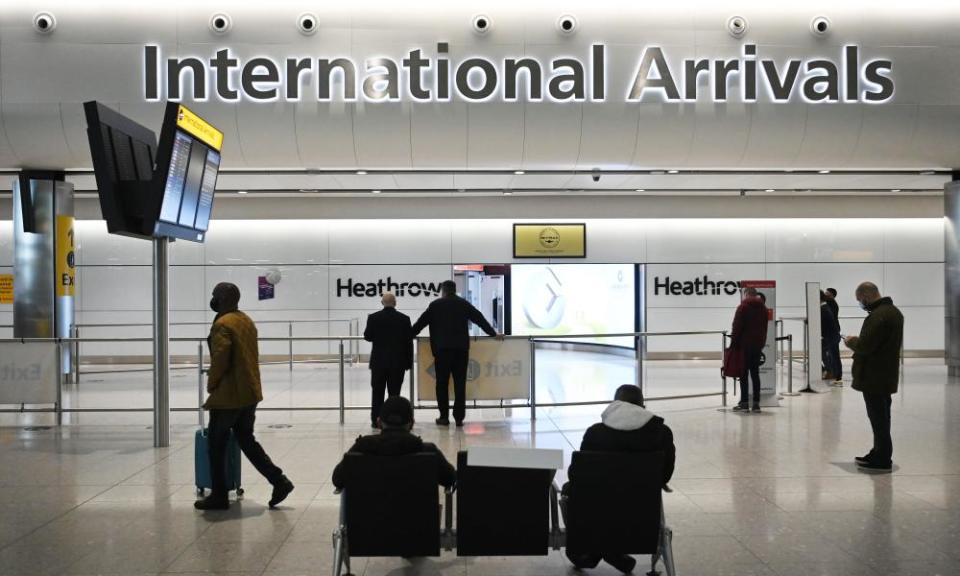How quarantine rules work and what UK government is planning

With new hotel quarantine measures for international arrivals from high-risk countries due to be introduced to curb the spread of Covid-19, focus falls on how they will work.
Here, we look at what the rules are now and what’s being done by the UK government to toughen border controls.
What are the current rules?
This month Boris Johnson scrapped the government’s travel corridor policy, which had allowed passengers from some countries to avoid the requirement to quarantine for 10 days when they arrive. In a further tightening of measures in January, international arrivals to the UK now have to provide proof of a negative coronavirus test taken up to 72 hours before departure although there are some exemptions for certain work-related trips.
Related: 'It’s disappointing': Britons frustrated at Covid quarantine rules
However, travellers not arriving from high-risk countries have been able to leave isolation sooner in England if they pay for a Covid test after five days that returns a negative result. Separately, there are UK travel bans in place which bar entry to people from more than two dozen countries to prevent the spread of new Covid variants. The bans do not apply to returning British and Irish nationals or those with residency rights in the UK.
What changes are being made?
International arrivals from high-risk countries on the banned list will have to quarantine in government-provided accommodation, such as hotels, for 10 days. They will be transported directly into quarantine after being met at the airport, the prime minister told MPs on Wednesday as he outlined the measures.
The UK government has not yet stated when the new restrictions, which are on top of the curbs already in place, will be introduced but the policy could take several weeks to implement. The Department of Health and Social Care is due to provide further details on the approach next week.
What countries will the measures apply to?
Speaking separately to the Commons later on Wednesday, the home secretary, Priti Patel, said: “We will introduce a new managed isolation process in hotels for those who cannot be refused entry, including those arriving home from countries where we have already imposed international travel bans.”
Patel did not list the countries from where arrivals will have to quarantine in hotels, but it will apply to the 30 locations on the UK travel ban list. They mostly include countries in South America – such as Brazil, Argentina and Peru – and in southern Africa, including South Africa, Tanzania and Zimbabwe. But the ban also applies to Portugal. In effect, it means that returning British and Irish nationals, or those with residency rights, would have to quarantine at hotels for 10 days, given travel is already restricted for others from those nations.
How much will it cost?
Details have yet to be set out by the UK government but arrivals are expected to have to foot the bill for their quarantine stays, which are likely to cost upwards of £1,000 per person.
What about the devolved nations?
Related: Life in hotel quarantine: 'I'm on day two. It's around day 11 things get difficult'
Each nation has its own powers to implement quarantine restrictions, although Johnson said the Cabinet Office minister, Michael Gove, had spoken to the first ministers of Scotland and Wales, as well as the first and deputy first ministers of Northern Ireland, earlier on Wednesday. The prime minister said: “As we have throughout this pandemic, we will be working closely with the DAs [devolved administrations] to implement these new measures so that, where possible, we can continue with a UK-wide approach.”
Scotland’s first minister, Nicola Sturgeon, said her government would “initially emulate the UK government’s steps on enhancing quarantine arrangements”. She added: “We will be seeking urgently to persuade them to go much further and indeed to move to a comprehensive system of supervised quarantine.” The Welsh government said it had agreed on the need for a “joint approach” to strengthen border measures but did not believe that measures set out by the UK government went far enough.
What else is happening?
Under current restrictions, people must stay home and not leave to travel, including internationally, unless they have a legally permitted reason to do so, such as work. A new requirement will be introduced that people who wish to travel abroad must make a declaration stating why they need to do so. “This reason for travel will be checked by carriers prior to departure,” Patel said.
Police presence will also be increased at ports and airports, Patel explained, with people fined if they are in breach of the stay-at-home regulations. The home secretary warned: “Anyone who does not have a valid reason for travel will be directed to return home or they will face a fine.”
The list of travel exemptions will also be urgently reviewed, she added, to ensure only the most important and those with “exceptional reasons” are included. Police will also step up physical checks to ensure people are isolating at addresses, the Home Office said.

 Yahoo Finance
Yahoo Finance